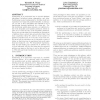Free Online Productivity Tools
i2Speak
i2Symbol
i2OCR
iTex2Img
iWeb2Print
iWeb2Shot
i2Type
iPdf2Split
iPdf2Merge
i2Bopomofo
i2Arabic
i2Style
i2Image
i2PDF
iLatex2Rtf
Sci2ools
207
click to vote
ICDT
2009
ACM
2009
ACM
Optimal splitters for database partitioning with size bounds
Partitioning is an important step in several database algorithms, including sorting, aggregation, and joins. Partitioning is also fundamental for dividing work into equal-sized (or balanced) parallel subtasks. In this paper, we aim to find, materialize and maintain a set of partitioning elements (splitters) for a data set. Unlike traditional partitioning elements, our splitters define both inequality and equality partitions, which allows us to bound the size of the inequality partitions. We provide an algorithm for determining an optimal set of splitters from a sorted data set and show that it has time complexity O(k lg2 N), where k is the number of splitters requested and N is the size of the data set. We show how the algorithm can be extended to pairs of tables, so that joins can be partitioned into work units that have balanced cost. We demonstrate experimentally (a) that finding the optimal set of splitters can be done efficiently, and (b) that using the precomputed splitters can ...
Related Content
| Added | 21 Nov 2009 |
| Updated | 21 Nov 2009 |
| Type | Conference |
| Year | 2009 |
| Where | ICDT |
| Authors | Kenneth A. Ross, John Cieslewicz |
Comments (0)

